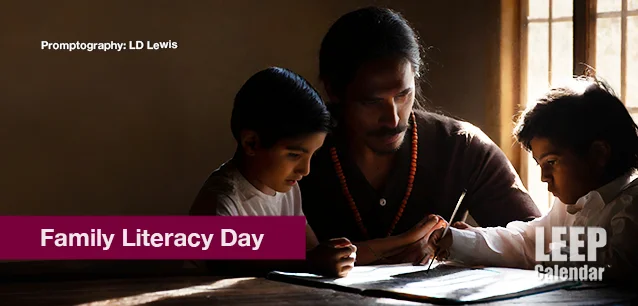 AD
AD
Today is: December 31
Scroll to explore events active on this date.
Additional Events on LEEP
LEEP INK FEATURES

August? Absolutely!
In August, we live through the Dog Days of Summer. It's hot and often humid, and those who can leave for better climates do. Down south, winter is in full force. August is also known as "the ...

In The Heat of July: July 2025 Events
Is it hot enough (or cold enough if you're below the equator) for you yet? There is actually a day for that! Like every month, I pick a diverse collection of events you may or may not know about. This ...

May Blooms: Events in May 2025
Along with October, May is one of the most densely packed months of the year. It's before the summer humidity and the last whole month of the school year. The weather is warming in t...
About Family Literacy Day
Education , Children
United States
Ends: Nov 01, 2024
DESCRIPTION:
Family Literacy Day and Family Literacy Month began in 1994. Both are dedicated initiatives in the United States designed to encourage and enhance reading and literacy skills within families. These events underscore the vital role of literacy in fostering educational growth and strengthening family bonds.
Family Literacy Day—Celebrated annually on November 1st, Family Literacy Day serves as a kickoff to Family Literacy Month. This day is an opportunity for schools, libraries, and community organizations to conduct literacy-related activities, emphasizing the importance of reading and learning together as a family. Activities include storytelling sessions, book fairs, workshops for parents on how to aid their children's literacy development, and reading challenges.
Family Literacy Month—observed throughout November, extends the focus on literacy activities and engagement. During Family Literacy Month, families are encouraged to set aside time for reading together, visit libraries, and participate in community literacy events. The aim is to build a home reading culture, emphasizing that parents and caregivers are their children's first and most influential teachers.
Various educational and non-profit organizations across the country support these initiatives. These organizations provide resources and support to families, helping to improve literacy skills and fostering a lifelong love of reading. The emphasis is on children's literacy and adult education and ESL (English as a Second Language) programs, recognizing that family literacy involves all family members.
The impact of these initiatives is significant, as studies show that children whose parents are involved in their reading activities are more likely to develop strong reading skills, perform better academically, and have a greater love of learning. Family Literacy Day and Month aim to bridge gaps in literacy, promote equal educational opportunities, and strengthen communities through the power of reading.
VIDEOS
SUPPORTING DOCUMENTS
Currently, this event does not have supporting documents.
ADDITIONAL IMAGES
Currently, this event does not have supporting images.
Where would you like to go now?
 AD
AD


/footer-logo.svg)
